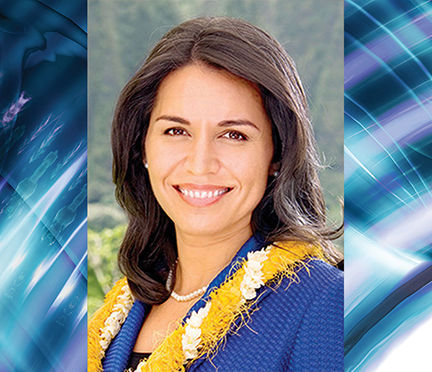Thanks to shortsighted politicians addicted to regime change wars, my constituents in Hawaii and the American people are on the verge of a stark new reality. As the United States faces an increasingly hostile and dangerously capable North Korea, we
Thanks to shortsighted politicians addicted to regime change wars, my constituents in Hawaii and the American people are on the verge of a stark new reality.
As the United States faces an increasingly hostile and dangerously capable North Korea, we are spending billions on strengthening our missile defense systems, leaders from my home state are discussing reopening and restocking 1950s fallout shelters, and plans are in the works to teach a new generation of children how to “duck and cover,” inflicting upon them the same nightmares many baby boomers faced throughout the Cold War.
Like his father, Kim Jong Un is a terrible tyrant that pursues his own grandeur at the expense of his people who starve and languish in isolation. Kim Jong Un’s latest missile tests follow a long history of North Korea’s strengthening and building up its nuclear weapons program.
But we must recognize that their actions have not taken place in a vacuum. Kim Jong Il and Kim Jong Un learned lessons from the U.S. toppling other evil tyrants — like Saddam Hussein and Moammar Gadhafi.
Every time the U.S. embarks on a new war to “rid the world of a monster,” it deepens the resolve of other “monsters” who believe the only way to protect themselves from our penchant for regime change wars is to have nuclear weapons as a deterrent.
In 2003, the world watched as the U.S. invaded Iraq and overthrew Saddam Hussein’s government in a war justified by U.S. “intelligence” reports linking Saddam Hussein to al Qaeda and claims that Iraq had weapons of mass destruction—both of which turned out to be false.
Soon after, Libyan President Gadhafi announced he would voluntarily give up his nuclear weapons program, believing that would keep the U.S. from attacking him. Gadhafi even encouraged other nations like Iran and North Korea to follow his example, winning praise from President Bush and other western leaders.
But then, the U.S. and our allies decided that, like Hussein, Gadhafi had to go. These wars to overthrow Saddam Hussein and Muammar Gaddafi resulted in tremendous loss of life and the strengthening of terrorist groups like al Qaeda and ISIS.
Kim Jong Il, Kim Jong Un and other world leaders saw what we did in Iraq and Libya and got the message loud and clear: To avoid being toppled, acquire and tighten your grip on nuclear weapons. Last year, North Korea’s state news agency touted that both Hussein and Gadhafi had “made the mistake of yielding to Western pressure led by a United States bent on regime change.”
The truth is, Trump would never have launched 59 Tomahawk missiles against Syria if they had nuclear weapons — a fact which certainly has not been lost on Kim Jong Un. Indeed, the North Korean government said that the U.S. missile strike against Syria proved that its decision to develop nuclear weapons was “the right choice a million times over.”
Secretary of State Rex Tillerson, United Nations Ambassador Nikki Haley, as well as Democrat and Republican leaders, crowed that our missile attack against Syria “sent a message to North Korea.” But the message Kim received was not the message that the administration thought it sent.
Our actions, including Trump’s illegal missile attack against Syria escalating our CIA-led regime change war in Syria, have eroded U.S. credibility and sent a foolish, short-sighted message to Kim Jong Un and other tyrants: The only way for North Korea to deter an American attack is to tighten their grip on their nuclear weapons.
As long as the United States continues pursuing deadly regime change wars, there is no hope for diplomatic solutions to the challenges we face — in North Korea, Syria and other parts of the world. If the U.S. is serious about getting North Korea to give up its nuclear weapons, we must end the regime change war in Syria and begin to restore our credibility.
Our failure to do so stands in the way of any possibility of making progress toward nonproliferation and a peaceful, diplomatic solution to the serious challenges we face.
I strongly urge the Trump administration to pursue a diplomatic path to peace and engage in direct negotiations. Doing so could lower the potential for catastrophic war and ultimately lead to the denuclearization of the Korean peninsula.
•••
Rep. Tulsi Gabbard is an Iraq War veteran and represents Hawaii’s 2nd District. She is a member of the House Foreign Affairs and Armed Services committees.


